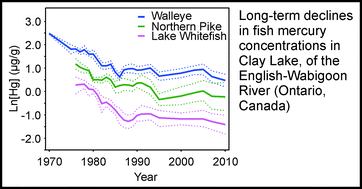Long-term changes in fish mercury levels in the historically impacted English-Wabigoon River system (Canada)†
Abstract
The English-Wabigoon River system in Northwestern Ontario, Canada, was one of the most heavily mercury-contaminated waterways in the world due to historical discharges in the 1960s from a chlor-alkali plant. This study examines long-term (1970–2010) monitoring data to assess temporal trends in mercury contamination in Walleye, Northern Pike and Lake Whitefish, three species important for sport and subsistence fishing in this region, using dynamic linear modeling and piecewise regression. For all lakes and species, there is a significant decline (36–94%) in mercury concentrations through time; however, there is evidence that this decline is either slowing down or levelling off. Concentrations in the English-Wabigoon fish are elevated, and may still present a potential health risk to humans consuming fish from this system. Various biotic and abiotic factors are examined as possible explanations to slowing rates of decline in mercury concentrations observed in the mid-1980s.


 Please wait while we load your content...
Please wait while we load your content...